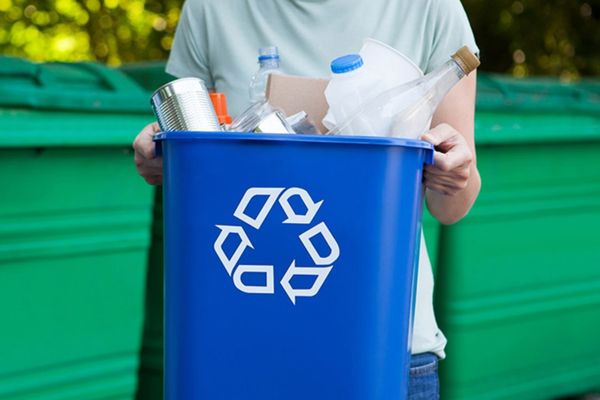Waste management requirements in Vietnam under the Law on Environmental Protection 2020
What are the waste management requirements in Vietnam under the current regulations? - Hong Phuong (Ben Tre)

Waste management requirements in Vietnam under the Law on Environmental Protection 2020 (Internet image)
Regarding this matter, LawNet would like to answer as follows:
1. Waste management requirements in Vietnam under the Law on Environmental Protection 2020
Waste management requirements in Vietnam according to Article 72 of the Law on Environmental Protection 2020 are as follows:
- General requirements for management of domestic solid waste, hazardous waste and normal industrial solid waste are as follows:
+ Waste must be managed during its generation, reduction, classification, collection, storage, transfer, transport, reuse, recycling, treatment and disposal;
+ Hazardous waste and normal industrial solid waste source owners shall reuse, recycle, treat and recover energy from such waste or transfer them to licensed facilities having appropriate environmental license;
+ Controlled industrial waste source owner shall identify whether waste is hazardous waste or normal industrial solid waste through the sample collection and analysis carried out by competent facilities in accordance with regulations of law. After the identification, industrial waste must be managed as prescribed by law;
+ Waste that satisfies standards and technical regulations applicable to raw materials, fuels and materials in accordance with regulations of law on quality of products and goods must be managed as the products and goods and is permitted to be used as raw materials, fuels and materials in production activities;
+ Entities that transport domestic solid waste, hazardous waste and normal industrial solid waste subject to treatment shall transport waste to licensed facilities having appropriate environmental licenses or transfer them to other transporters to be transported to licensed facilities having an appropriate environmental license;
+ The management of radioactive waste shall comply with regulations of law atomic energy.
- General requirements for waste management are as follows:
+ Wastewater must be collected and treated according to technical regulations on environment before being discharged into the receiving bodies;
+ It is advisable to reuse wastewater that satisfies environmental protection requirements and serves intended purposes;
+ Wastewater whose environmental parameters exceed the permissible levels must be managed in accordance with hazardous waste management;
+ The discharge of treated wastewater into the environment must be managed in accordance with regulations of law on environmental protection and relevant to the carrying capacity of receiving water bodies;
- Exhaust gases must be collected and treated in accordance with environmental protection requirements.
- Every entity that generates waste shall adopt resource- and energy-efficient solutions; use environmentally-friendly raw materials, fuels and materials and renewable energy; apply cleaner production technologies and programs, control environment and other measures to minimize waste generation; update information to the national environmental database upon transfer of hazardous waste and normal industrial solid waste subject to treatment to facilities having an appropriate environmental license.
- The State shall introduce a policy to encourage private sector involvement in collection, transport, reuse, recycling and treatment of waste and recovery of energy from the treatment of waste; apply advanced and environmentally-friendly technologies for waste management and best available techniques in order to minimize and control the generation of secondary waste, minimize solid waste ending up buried; encourage the co-processing of waste and use of waste as substitute materials, fuels and materials.
- The Minister of Natural Resources and Environment shall promulgate a list of hazardous waste, controlled industrial waste and normal industrial solid waste; technical requirements for environmental protection for vehicles transporting domestic solid waste, normal industrial solid waste and hazardous waste.
- Provincial People’s Committees shall manage waste within their provinces; promulgate waste management regulations and implement policies to provide incentives and assistance for waste management as prescribed by law.
- The Government shall elaborate the prevention, reduction, classification, collection, transport, reuse, recycling and treatment of waste.
2. Classification, storage and transfer of domestic solid waste in Vietnam
Classification, storage and transfer of domestic solid waste in Vietnam according to Article 75 of the Law on Environmental Protection 2020 as follows:
- Domestic solid waste generated by households and individuals is classified as:
+ Reusable and recyclable solid waste;
+ Food waste;
+ Other domestic solid waste.
- Provincial People’s Committees shall classify domestic solid waste specified in Point c Clause 1 of Article 75 of the Law on Environmental Protection 2020 within their provinces under the guidance of the Ministry of Natural Resources and Environment; introduce policies to encourage the classification of hazardous waste present in domestic solid waste generated by households and individuals.
- Households and individuals in urban areas must contain the domestic solid waste already classified as prescribed in Clause 1 of Article 75 of the Law on Environmental Protection 2020 in packages for transfer as follows:
+ Reusable and recyclable solid waste shall be transferred to entities for reuse and recycling or facilities licensed for collection and transport of domestic solid waste;
+ Food waste and other domestic solid waste must be contained in packages as prescribed and transferred to facilities licensed for collection and transport of domestic solid waste; food waste may be used as organic fertilizers and animal feeds.
- Households and individuals in rural areas that generate domestic solid waste and classify them as prescribed in Clause 1 of Article 75 of the Law on Environmental Protection 2020 shall manage them as follows:
+ Households and individuals are encouraged to make the most of waste food to be used as organic fertilizers and animal feeds;
+ Reusable and recyclable solid waste shall be transferred to entities for reuse and recycling or facilities licensed for collection and transport of domestic solid waste;
+ If not used as prescribed in Point a of Clause 4 of Article 75 of the Law on Environmental Protection 2020, food waste shall be transferred to or facilities licensed for collection and transport of domestic solid waste;
+ Other domestic solid waste must be contained in packages as prescribed and transferred to facilities licensed for collection and transport of domestic solid waste.
- Households and individuals in rural areas that produce domestic solid waste shall classify, contain and transfer domestic solid waste as prescribed in Clause 3 of Article 75 of the Law on Environmental Protection 2020.
- The classification, collection, transport and treatment of bulky waste shall comply with regulations imposed by provincial People’s Committees.
- The Vietnamese Fatherland Front Committee and socio-political organizations at all levels shall encourage residential communities, households and individuals to classify domestic solid waste at source. Internal residential communities and socio-political organizations shall supervise the classification of domestic solid waste by households and individuals.
- Key word:
- waste management requirements
- in Vietnam
- Vietnam
- Cases of land rent exemption and reduction under the latest regulations in Vietnam
- Economic infrastructure and social infrastructure system in Thu Duc City, Ho Chi Minh City
- Regulations on ordination with foreign elements in religious organizations in Vietnam
- Increase land compensation prices in Vietnam from January 1, 2026
- Determination of land compensation levels for damage during land requisition process in Vietnam
- Who is permitted to purchase social housing according to latest regulations in Vietnam?
-

- Number of deputy directors of departments in Vietnam ...
- 15:04, 05/03/2025
-

- Cases ineligible for pardon in Vietnam in 2025
- 14:43, 05/03/2025
-

- Decree 50/2025 amending Decree 151/2017 on the ...
- 12:00, 05/03/2025
-

- Circular 07/2025 amending Circular 02/2022 on ...
- 11:30, 05/03/2025
-

- Adjustment to the organizational structure of ...
- 10:34, 05/03/2025
-

- Notable new policies of Vietnam effective as of ...
- 16:26, 11/04/2025
-
.Medium.png)
- Notable documents of Vietnam in the previous week ...
- 16:21, 11/04/2025
-
.Medium.png)
- Notable documents of Vietnam in the previous week ...
- 16:11, 02/04/2025
-
.Medium.png)
- Notable new policies of Vietnam to be effective ...
- 16:04, 02/04/2025
-
.Medium.png)
- Notable new policies of Vietnam effective from ...
- 14:51, 21/03/2025

 Article table of contents
Article table of contents
